Auditing & Assurance
VerifiedAdded on 2023/03/31
|7
|1419
|361
AI Summary
Financial frauds and scams have been increasing in today’s world owing to lack of proper regulations and control over audit process. To understand the nature of audit scams and role of auditors across regions and cultures, we will analyse few big scams from Ireland and India.
Contribute Materials
Your contribution can guide someone’s learning journey. Share your
documents today.
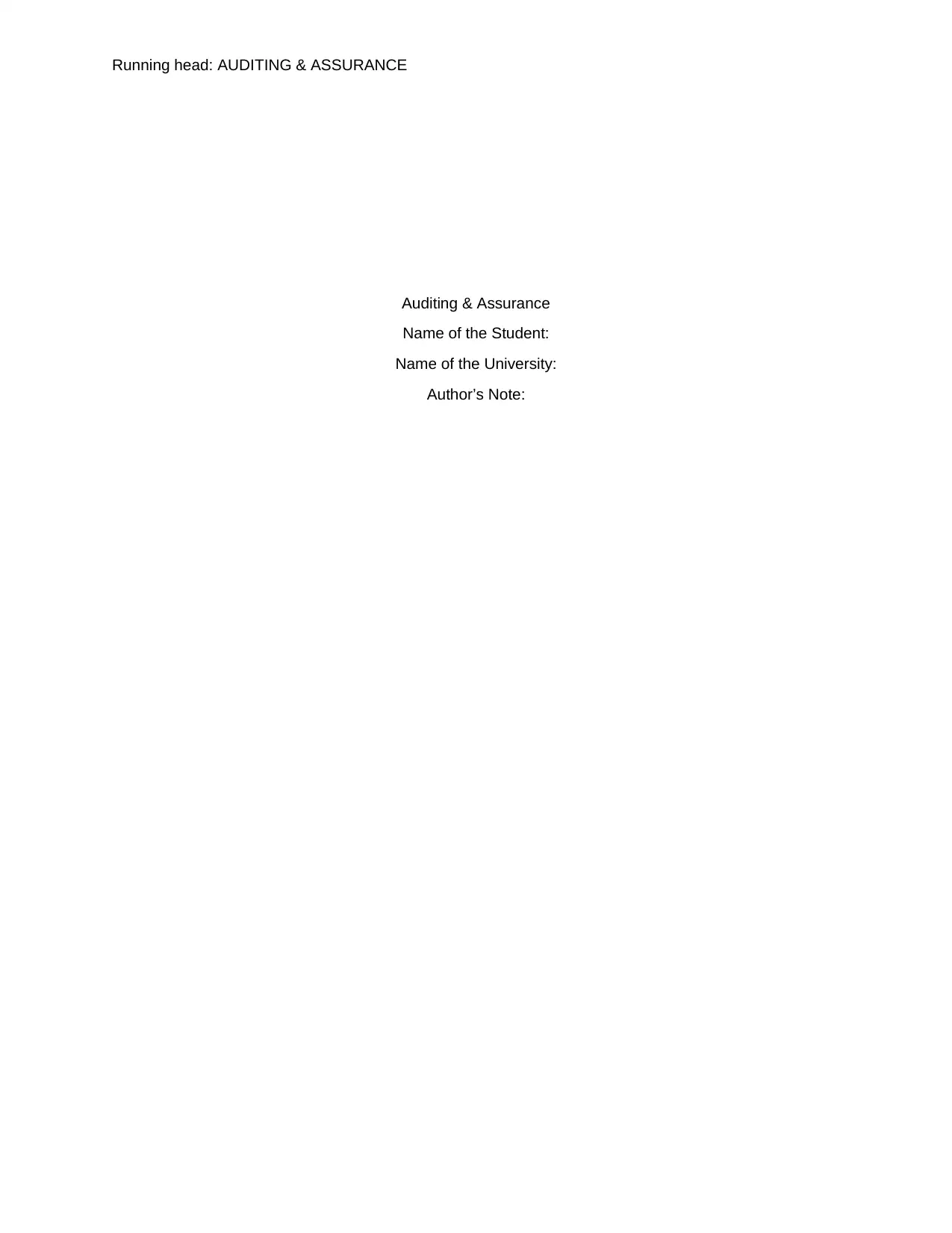
Running head: AUDITING & ASSURANCE
Auditing & Assurance
Name of the Student:
Name of the University:
Author’s Note:
Auditing & Assurance
Name of the Student:
Name of the University:
Author’s Note:
Secure Best Marks with AI Grader
Need help grading? Try our AI Grader for instant feedback on your assignments.
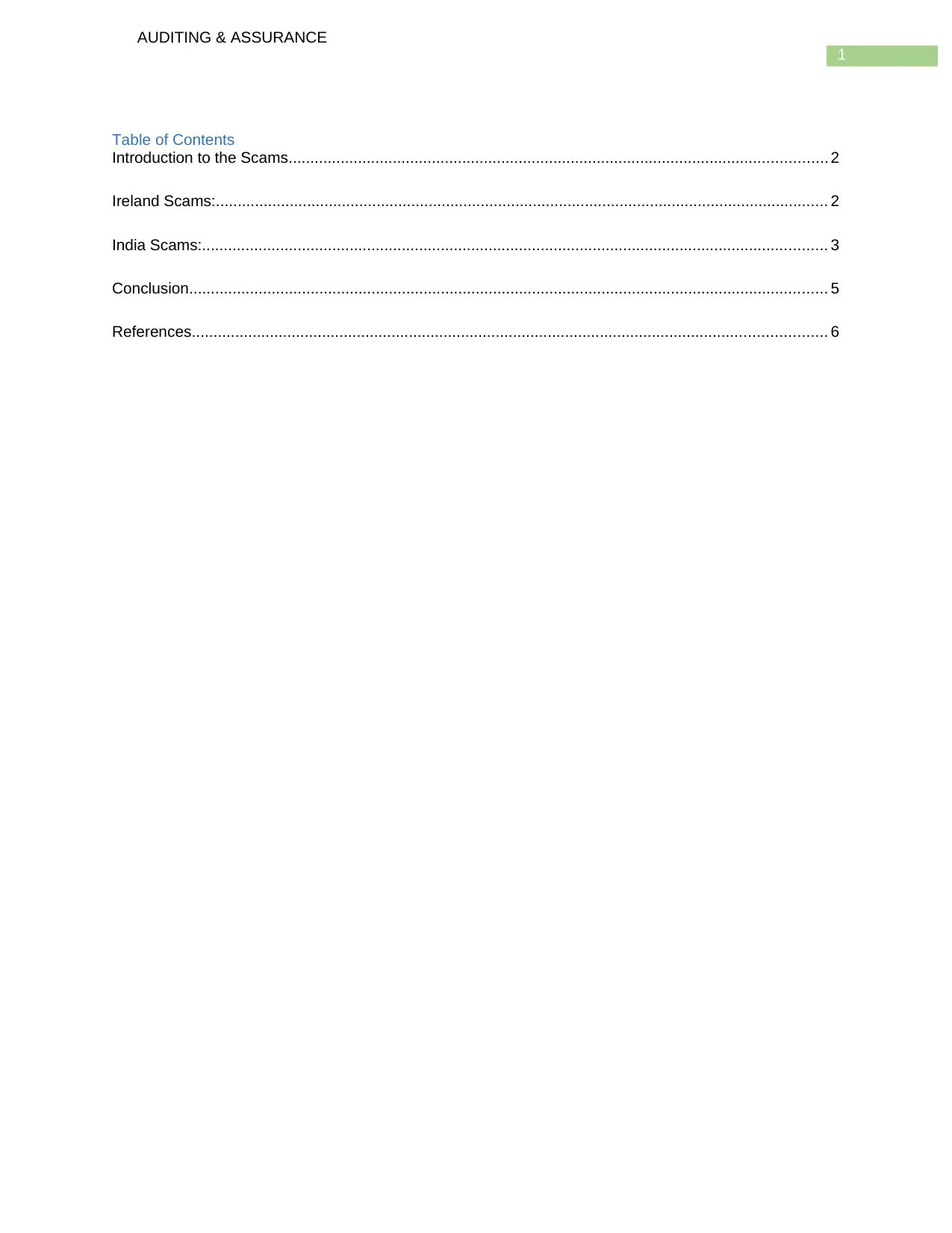
1
AUDITING & ASSURANCE
Table of Contents
Introduction to the Scams............................................................................................................................ 2
Ireland Scams:............................................................................................................................................. 2
India Scams:................................................................................................................................................ 3
Conclusion................................................................................................................................................... 5
References.................................................................................................................................................. 6
AUDITING & ASSURANCE
Table of Contents
Introduction to the Scams............................................................................................................................ 2
Ireland Scams:............................................................................................................................................. 2
India Scams:................................................................................................................................................ 3
Conclusion................................................................................................................................................... 5
References.................................................................................................................................................. 6
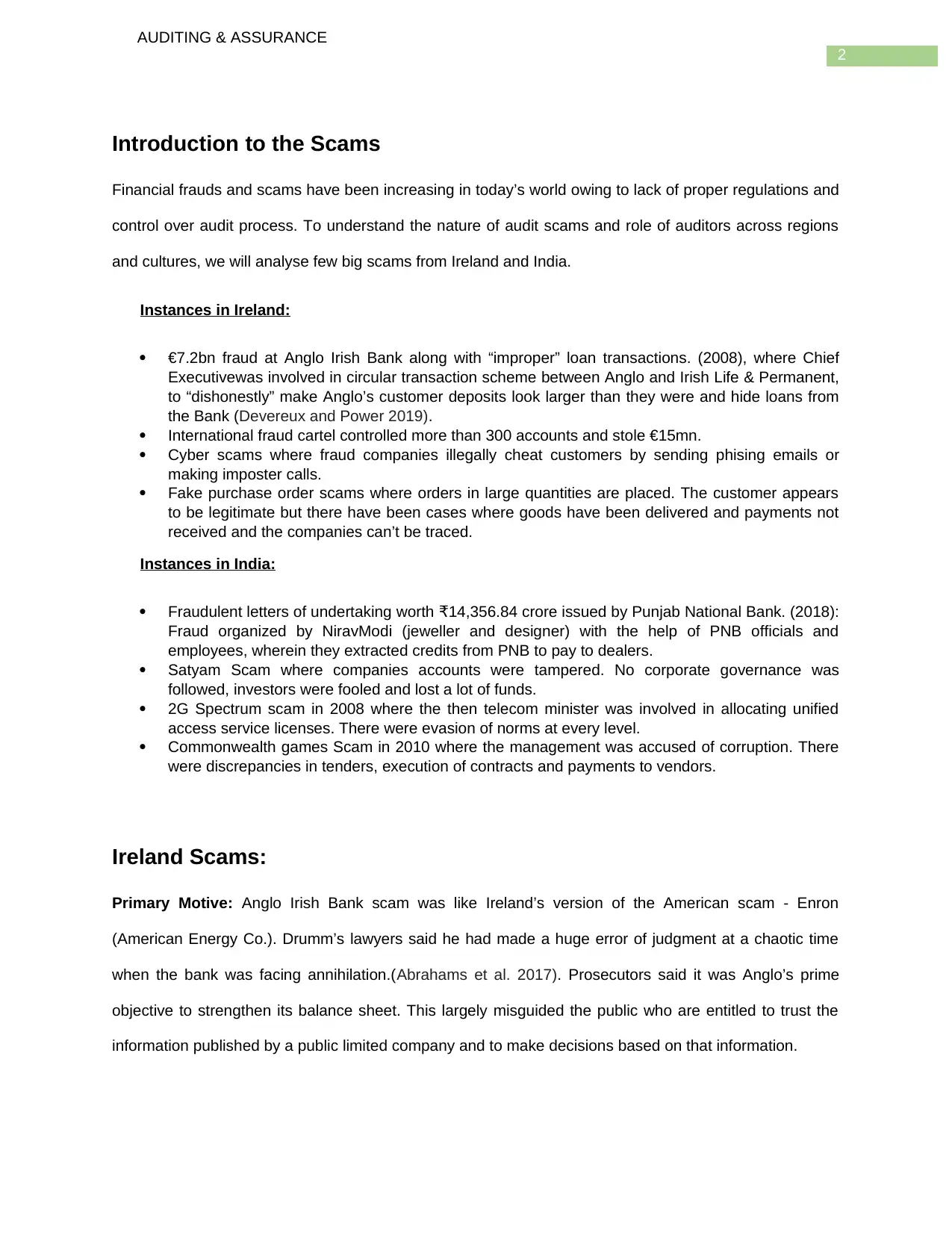
2
AUDITING & ASSURANCE
Introduction to the Scams
Financial frauds and scams have been increasing in today’s world owing to lack of proper regulations and
control over audit process. To understand the nature of audit scams and role of auditors across regions
and cultures, we will analyse few big scams from Ireland and India.
Instances in Ireland:
€7.2bn fraud at Anglo Irish Bank along with “improper” loan transactions. (2008), where Chief
Executivewas involved in circular transaction scheme between Anglo and Irish Life & Permanent,
to “dishonestly” make Anglo’s customer deposits look larger than they were and hide loans from
the Bank (Devereux and Power 2019).
International fraud cartel controlled more than 300 accounts and stole €15mn.
Cyber scams where fraud companies illegally cheat customers by sending phising emails or
making imposter calls.
Fake purchase order scams where orders in large quantities are placed. The customer appears
to be legitimate but there have been cases where goods have been delivered and payments not
received and the companies can’t be traced.
Instances in India:
Fraudulent letters of undertaking worth 14,356.84 crore issued by Punjab National Bank. (2018):₹
Fraud organized by NiravModi (jeweller and designer) with the help of PNB officials and
employees, wherein they extracted credits from PNB to pay to dealers.
Satyam Scam where companies accounts were tampered. No corporate governance was
followed, investors were fooled and lost a lot of funds.
2G Spectrum scam in 2008 where the then telecom minister was involved in allocating unified
access service licenses. There were evasion of norms at every level.
Commonwealth games Scam in 2010 where the management was accused of corruption. There
were discrepancies in tenders, execution of contracts and payments to vendors.
Ireland Scams:
Primary Motive: Anglo Irish Bank scam was like Ireland’s version of the American scam - Enron
(American Energy Co.). Drumm’s lawyers said he had made a huge error of judgment at a chaotic time
when the bank was facing annihilation.(Abrahams et al. 2017). Prosecutors said it was Anglo’s prime
objective to strengthen its balance sheet. This largely misguided the public who are entitled to trust the
information published by a public limited company and to make decisions based on that information.
AUDITING & ASSURANCE
Introduction to the Scams
Financial frauds and scams have been increasing in today’s world owing to lack of proper regulations and
control over audit process. To understand the nature of audit scams and role of auditors across regions
and cultures, we will analyse few big scams from Ireland and India.
Instances in Ireland:
€7.2bn fraud at Anglo Irish Bank along with “improper” loan transactions. (2008), where Chief
Executivewas involved in circular transaction scheme between Anglo and Irish Life & Permanent,
to “dishonestly” make Anglo’s customer deposits look larger than they were and hide loans from
the Bank (Devereux and Power 2019).
International fraud cartel controlled more than 300 accounts and stole €15mn.
Cyber scams where fraud companies illegally cheat customers by sending phising emails or
making imposter calls.
Fake purchase order scams where orders in large quantities are placed. The customer appears
to be legitimate but there have been cases where goods have been delivered and payments not
received and the companies can’t be traced.
Instances in India:
Fraudulent letters of undertaking worth 14,356.84 crore issued by Punjab National Bank. (2018):₹
Fraud organized by NiravModi (jeweller and designer) with the help of PNB officials and
employees, wherein they extracted credits from PNB to pay to dealers.
Satyam Scam where companies accounts were tampered. No corporate governance was
followed, investors were fooled and lost a lot of funds.
2G Spectrum scam in 2008 where the then telecom minister was involved in allocating unified
access service licenses. There were evasion of norms at every level.
Commonwealth games Scam in 2010 where the management was accused of corruption. There
were discrepancies in tenders, execution of contracts and payments to vendors.
Ireland Scams:
Primary Motive: Anglo Irish Bank scam was like Ireland’s version of the American scam - Enron
(American Energy Co.). Drumm’s lawyers said he had made a huge error of judgment at a chaotic time
when the bank was facing annihilation.(Abrahams et al. 2017). Prosecutors said it was Anglo’s prime
objective to strengthen its balance sheet. This largely misguided the public who are entitled to trust the
information published by a public limited company and to make decisions based on that information.
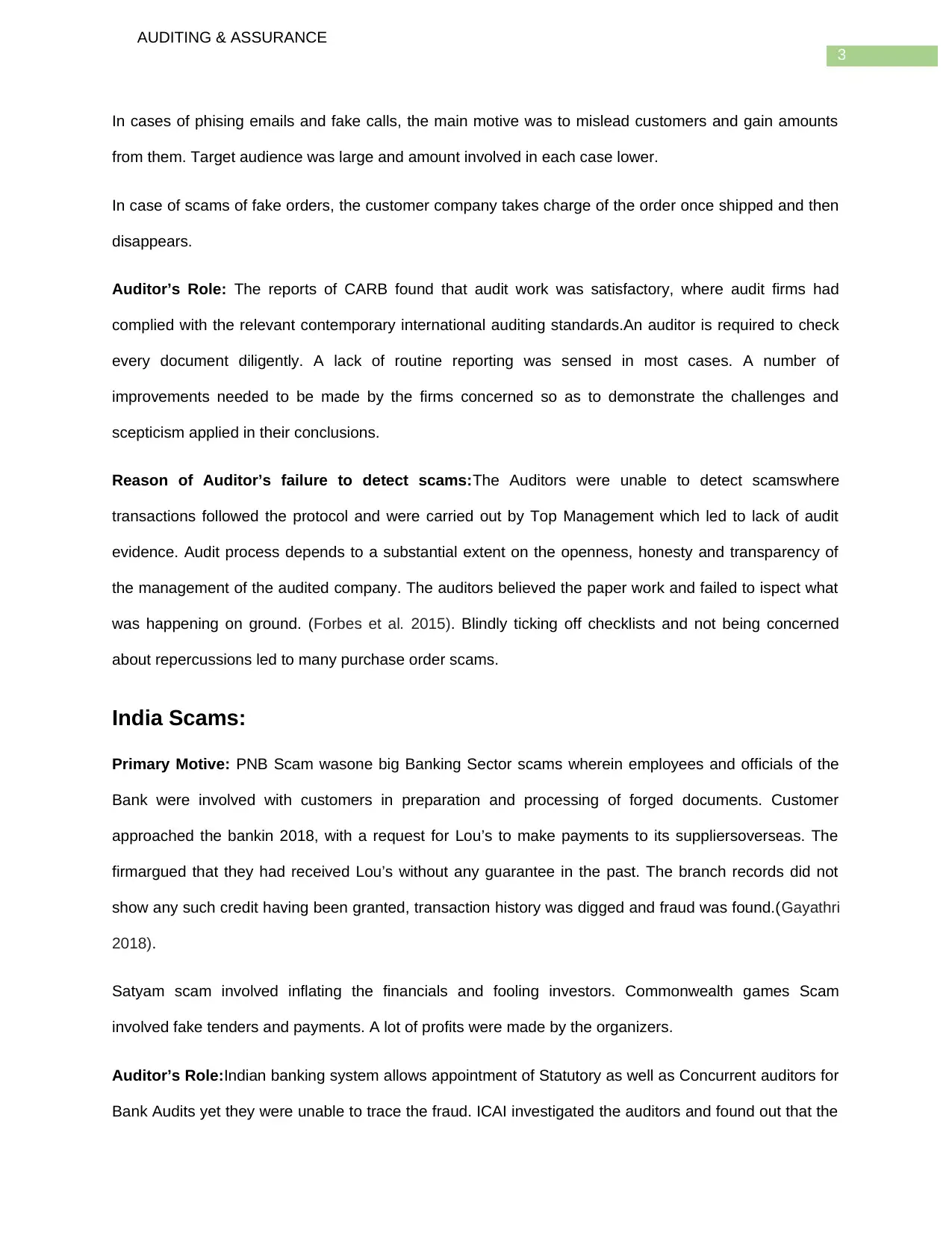
3
AUDITING & ASSURANCE
In cases of phising emails and fake calls, the main motive was to mislead customers and gain amounts
from them. Target audience was large and amount involved in each case lower.
In case of scams of fake orders, the customer company takes charge of the order once shipped and then
disappears.
Auditor’s Role: The reports of CARB found that audit work was satisfactory, where audit firms had
complied with the relevant contemporary international auditing standards.An auditor is required to check
every document diligently. A lack of routine reporting was sensed in most cases. A number of
improvements needed to be made by the firms concerned so as to demonstrate the challenges and
scepticism applied in their conclusions.
Reason of Auditor’s failure to detect scams:The Auditors were unable to detect scamswhere
transactions followed the protocol and were carried out by Top Management which led to lack of audit
evidence. Audit process depends to a substantial extent on the openness, honesty and transparency of
the management of the audited company. The auditors believed the paper work and failed to ispect what
was happening on ground. (Forbes et al. 2015). Blindly ticking off checklists and not being concerned
about repercussions led to many purchase order scams.
India Scams:
Primary Motive: PNB Scam wasone big Banking Sector scams wherein employees and officials of the
Bank were involved with customers in preparation and processing of forged documents. Customer
approached the bankin 2018, with a request for Lou’s to make payments to its suppliersoverseas. The
firmargued that they had received Lou’s without any guarantee in the past. The branch records did not
show any such credit having been granted, transaction history was digged and fraud was found.(Gayathri
2018).
Satyam scam involved inflating the financials and fooling investors. Commonwealth games Scam
involved fake tenders and payments. A lot of profits were made by the organizers.
Auditor’s Role:Indian banking system allows appointment of Statutory as well as Concurrent auditors for
Bank Audits yet they were unable to trace the fraud. ICAI investigated the auditors and found out that the
AUDITING & ASSURANCE
In cases of phising emails and fake calls, the main motive was to mislead customers and gain amounts
from them. Target audience was large and amount involved in each case lower.
In case of scams of fake orders, the customer company takes charge of the order once shipped and then
disappears.
Auditor’s Role: The reports of CARB found that audit work was satisfactory, where audit firms had
complied with the relevant contemporary international auditing standards.An auditor is required to check
every document diligently. A lack of routine reporting was sensed in most cases. A number of
improvements needed to be made by the firms concerned so as to demonstrate the challenges and
scepticism applied in their conclusions.
Reason of Auditor’s failure to detect scams:The Auditors were unable to detect scamswhere
transactions followed the protocol and were carried out by Top Management which led to lack of audit
evidence. Audit process depends to a substantial extent on the openness, honesty and transparency of
the management of the audited company. The auditors believed the paper work and failed to ispect what
was happening on ground. (Forbes et al. 2015). Blindly ticking off checklists and not being concerned
about repercussions led to many purchase order scams.
India Scams:
Primary Motive: PNB Scam wasone big Banking Sector scams wherein employees and officials of the
Bank were involved with customers in preparation and processing of forged documents. Customer
approached the bankin 2018, with a request for Lou’s to make payments to its suppliersoverseas. The
firmargued that they had received Lou’s without any guarantee in the past. The branch records did not
show any such credit having been granted, transaction history was digged and fraud was found.(Gayathri
2018).
Satyam scam involved inflating the financials and fooling investors. Commonwealth games Scam
involved fake tenders and payments. A lot of profits were made by the organizers.
Auditor’s Role:Indian banking system allows appointment of Statutory as well as Concurrent auditors for
Bank Audits yet they were unable to trace the fraud. ICAI investigated the auditors and found out that the
Secure Best Marks with AI Grader
Need help grading? Try our AI Grader for instant feedback on your assignments.
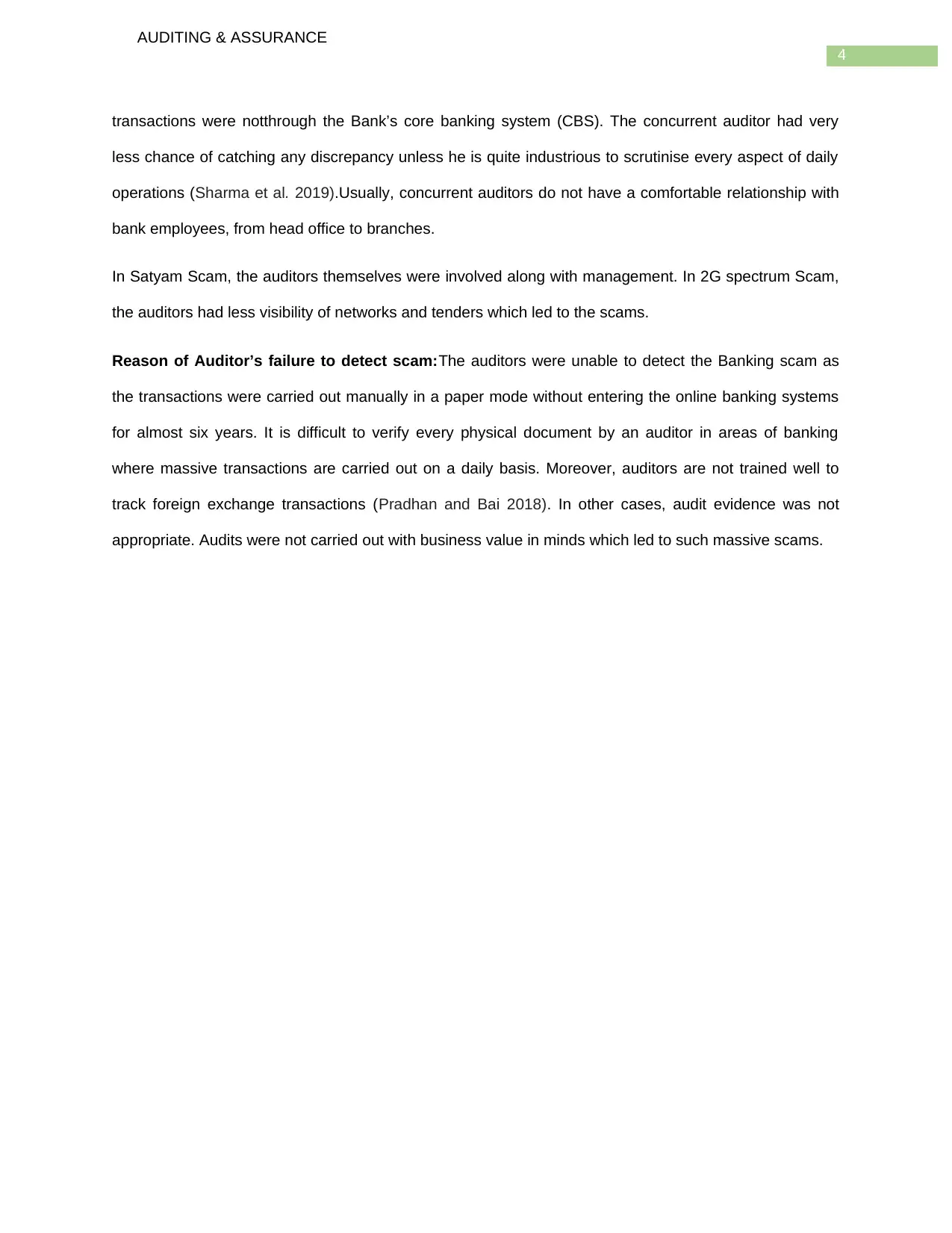
4
AUDITING & ASSURANCE
transactions were notthrough the Bank’s core banking system (CBS). The concurrent auditor had very
less chance of catching any discrepancy unless he is quite industrious to scrutinise every aspect of daily
operations (Sharma et al. 2019).Usually, concurrent auditors do not have a comfortable relationship with
bank employees, from head office to branches.
In Satyam Scam, the auditors themselves were involved along with management. In 2G spectrum Scam,
the auditors had less visibility of networks and tenders which led to the scams.
Reason of Auditor’s failure to detect scam:The auditors were unable to detect the Banking scam as
the transactions were carried out manually in a paper mode without entering the online banking systems
for almost six years. It is difficult to verify every physical document by an auditor in areas of banking
where massive transactions are carried out on a daily basis. Moreover, auditors are not trained well to
track foreign exchange transactions (Pradhan and Bai 2018). In other cases, audit evidence was not
appropriate. Audits were not carried out with business value in minds which led to such massive scams.
AUDITING & ASSURANCE
transactions were notthrough the Bank’s core banking system (CBS). The concurrent auditor had very
less chance of catching any discrepancy unless he is quite industrious to scrutinise every aspect of daily
operations (Sharma et al. 2019).Usually, concurrent auditors do not have a comfortable relationship with
bank employees, from head office to branches.
In Satyam Scam, the auditors themselves were involved along with management. In 2G spectrum Scam,
the auditors had less visibility of networks and tenders which led to the scams.
Reason of Auditor’s failure to detect scam:The auditors were unable to detect the Banking scam as
the transactions were carried out manually in a paper mode without entering the online banking systems
for almost six years. It is difficult to verify every physical document by an auditor in areas of banking
where massive transactions are carried out on a daily basis. Moreover, auditors are not trained well to
track foreign exchange transactions (Pradhan and Bai 2018). In other cases, audit evidence was not
appropriate. Audits were not carried out with business value in minds which led to such massive scams.
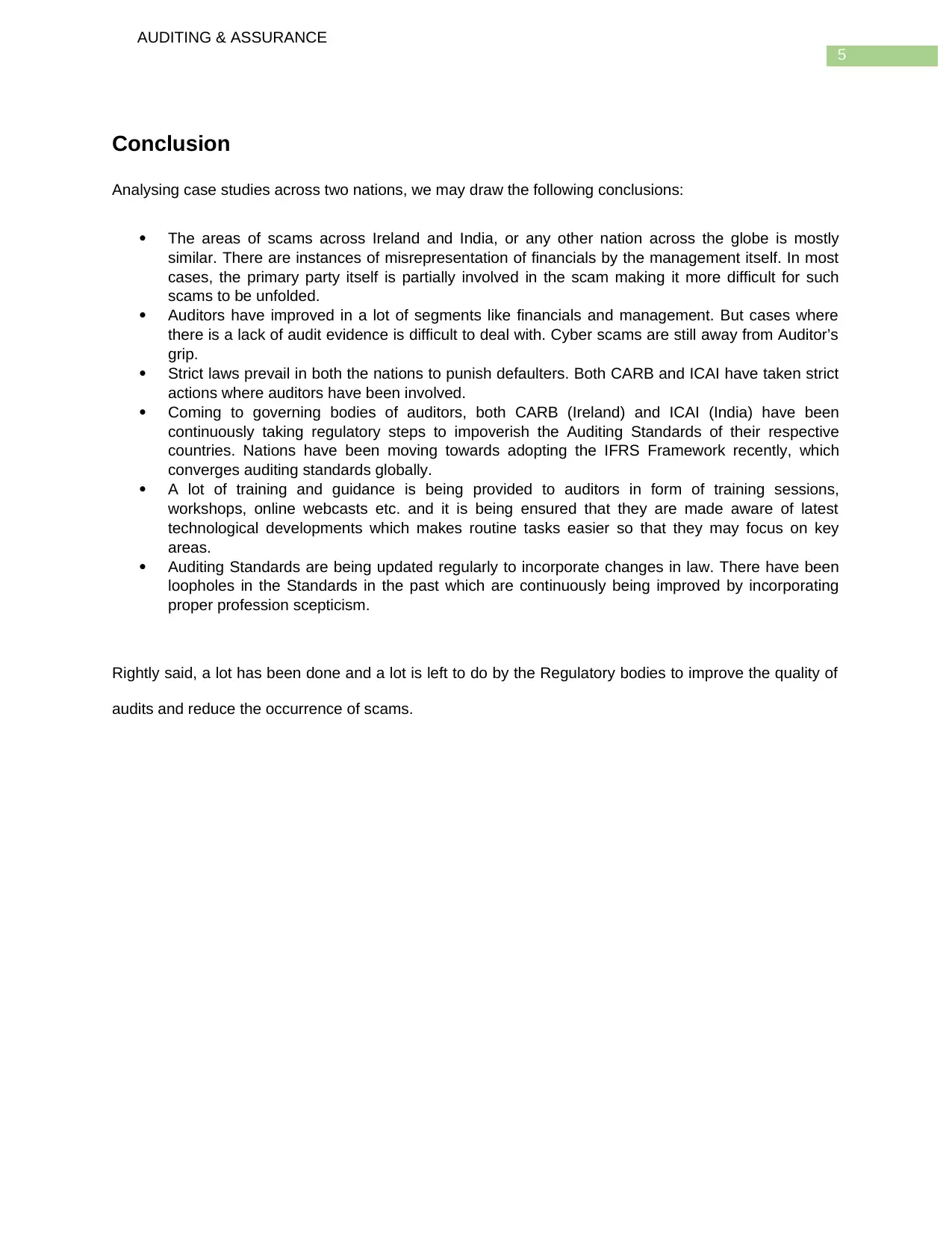
5
AUDITING & ASSURANCE
Conclusion
Analysing case studies across two nations, we may draw the following conclusions:
The areas of scams across Ireland and India, or any other nation across the globe is mostly
similar. There are instances of misrepresentation of financials by the management itself. In most
cases, the primary party itself is partially involved in the scam making it more difficult for such
scams to be unfolded.
Auditors have improved in a lot of segments like financials and management. But cases where
there is a lack of audit evidence is difficult to deal with. Cyber scams are still away from Auditor’s
grip.
Strict laws prevail in both the nations to punish defaulters. Both CARB and ICAI have taken strict
actions where auditors have been involved.
Coming to governing bodies of auditors, both CARB (Ireland) and ICAI (India) have been
continuously taking regulatory steps to impoverish the Auditing Standards of their respective
countries. Nations have been moving towards adopting the IFRS Framework recently, which
converges auditing standards globally.
A lot of training and guidance is being provided to auditors in form of training sessions,
workshops, online webcasts etc. and it is being ensured that they are made aware of latest
technological developments which makes routine tasks easier so that they may focus on key
areas.
Auditing Standards are being updated regularly to incorporate changes in law. There have been
loopholes in the Standards in the past which are continuously being improved by incorporating
proper profession scepticism.
Rightly said, a lot has been done and a lot is left to do by the Regulatory bodies to improve the quality of
audits and reduce the occurrence of scams.
AUDITING & ASSURANCE
Conclusion
Analysing case studies across two nations, we may draw the following conclusions:
The areas of scams across Ireland and India, or any other nation across the globe is mostly
similar. There are instances of misrepresentation of financials by the management itself. In most
cases, the primary party itself is partially involved in the scam making it more difficult for such
scams to be unfolded.
Auditors have improved in a lot of segments like financials and management. But cases where
there is a lack of audit evidence is difficult to deal with. Cyber scams are still away from Auditor’s
grip.
Strict laws prevail in both the nations to punish defaulters. Both CARB and ICAI have taken strict
actions where auditors have been involved.
Coming to governing bodies of auditors, both CARB (Ireland) and ICAI (India) have been
continuously taking regulatory steps to impoverish the Auditing Standards of their respective
countries. Nations have been moving towards adopting the IFRS Framework recently, which
converges auditing standards globally.
A lot of training and guidance is being provided to auditors in form of training sessions,
workshops, online webcasts etc. and it is being ensured that they are made aware of latest
technological developments which makes routine tasks easier so that they may focus on key
areas.
Auditing Standards are being updated regularly to incorporate changes in law. There have been
loopholes in the Standards in the past which are continuously being improved by incorporating
proper profession scepticism.
Rightly said, a lot has been done and a lot is left to do by the Regulatory bodies to improve the quality of
audits and reduce the occurrence of scams.
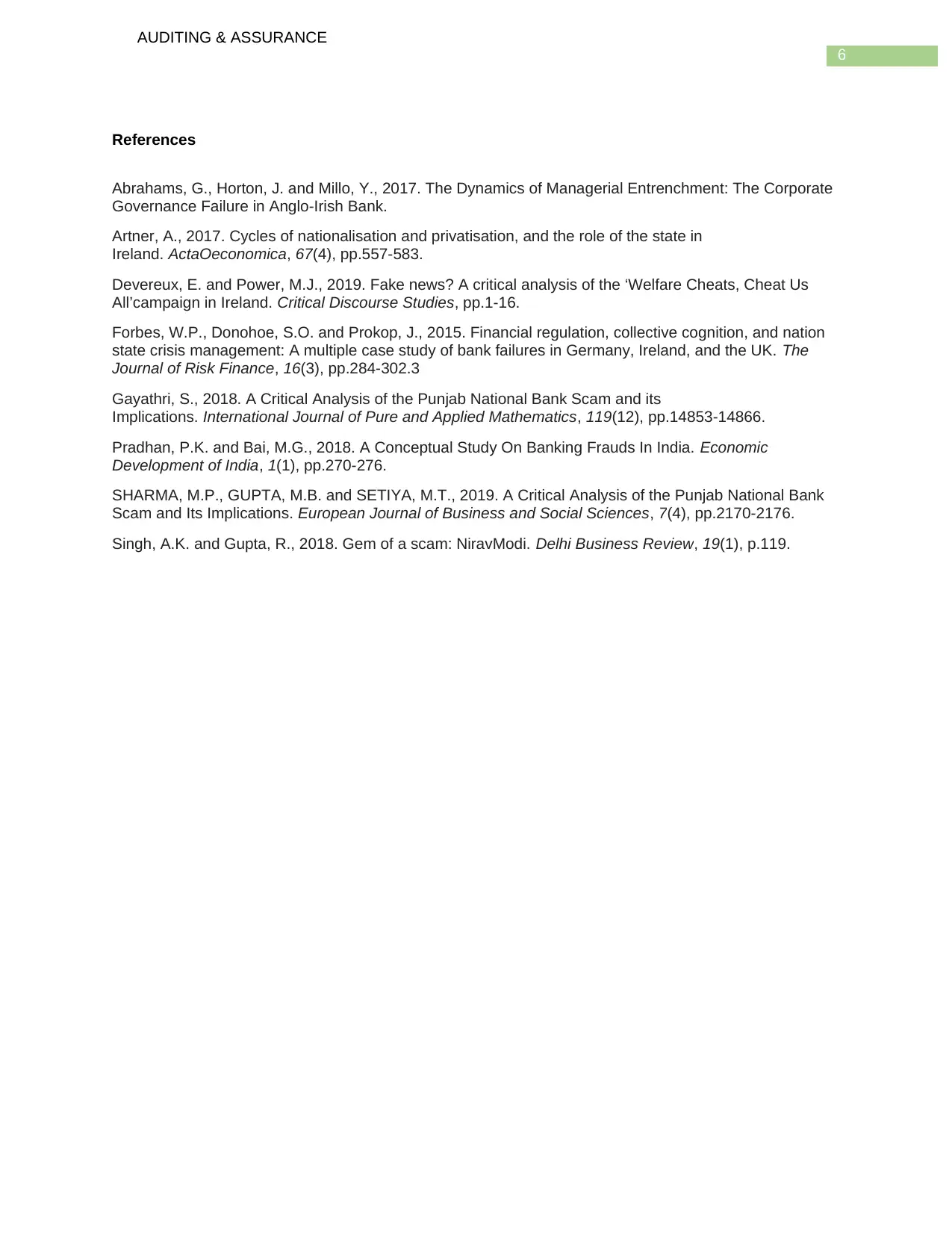
6
AUDITING & ASSURANCE
References
Abrahams, G., Horton, J. and Millo, Y., 2017. The Dynamics of Managerial Entrenchment: The Corporate
Governance Failure in Anglo-Irish Bank.
Artner, A., 2017. Cycles of nationalisation and privatisation, and the role of the state in
Ireland. ActaOeconomica, 67(4), pp.557-583.
Devereux, E. and Power, M.J., 2019. Fake news? A critical analysis of the ‘Welfare Cheats, Cheat Us
All’campaign in Ireland. Critical Discourse Studies, pp.1-16.
Forbes, W.P., Donohoe, S.O. and Prokop, J., 2015. Financial regulation, collective cognition, and nation
state crisis management: A multiple case study of bank failures in Germany, Ireland, and the UK. The
Journal of Risk Finance, 16(3), pp.284-302.3
Gayathri, S., 2018. A Critical Analysis of the Punjab National Bank Scam and its
Implications. International Journal of Pure and Applied Mathematics, 119(12), pp.14853-14866.
Pradhan, P.K. and Bai, M.G., 2018. A Conceptual Study On Banking Frauds In India. Economic
Development of India, 1(1), pp.270-276.
SHARMA, M.P., GUPTA, M.B. and SETIYA, M.T., 2019. A Critical Analysis of the Punjab National Bank
Scam and Its Implications. European Journal of Business and Social Sciences, 7(4), pp.2170-2176.
Singh, A.K. and Gupta, R., 2018. Gem of a scam: NiravModi. Delhi Business Review, 19(1), p.119.
AUDITING & ASSURANCE
References
Abrahams, G., Horton, J. and Millo, Y., 2017. The Dynamics of Managerial Entrenchment: The Corporate
Governance Failure in Anglo-Irish Bank.
Artner, A., 2017. Cycles of nationalisation and privatisation, and the role of the state in
Ireland. ActaOeconomica, 67(4), pp.557-583.
Devereux, E. and Power, M.J., 2019. Fake news? A critical analysis of the ‘Welfare Cheats, Cheat Us
All’campaign in Ireland. Critical Discourse Studies, pp.1-16.
Forbes, W.P., Donohoe, S.O. and Prokop, J., 2015. Financial regulation, collective cognition, and nation
state crisis management: A multiple case study of bank failures in Germany, Ireland, and the UK. The
Journal of Risk Finance, 16(3), pp.284-302.3
Gayathri, S., 2018. A Critical Analysis of the Punjab National Bank Scam and its
Implications. International Journal of Pure and Applied Mathematics, 119(12), pp.14853-14866.
Pradhan, P.K. and Bai, M.G., 2018. A Conceptual Study On Banking Frauds In India. Economic
Development of India, 1(1), pp.270-276.
SHARMA, M.P., GUPTA, M.B. and SETIYA, M.T., 2019. A Critical Analysis of the Punjab National Bank
Scam and Its Implications. European Journal of Business and Social Sciences, 7(4), pp.2170-2176.
Singh, A.K. and Gupta, R., 2018. Gem of a scam: NiravModi. Delhi Business Review, 19(1), p.119.
1 out of 7
Your All-in-One AI-Powered Toolkit for Academic Success.
+13062052269
info@desklib.com
Available 24*7 on WhatsApp / Email
![[object Object]](/_next/static/media/star-bottom.7253800d.svg)
Unlock your academic potential
© 2024 | Zucol Services PVT LTD | All rights reserved.

